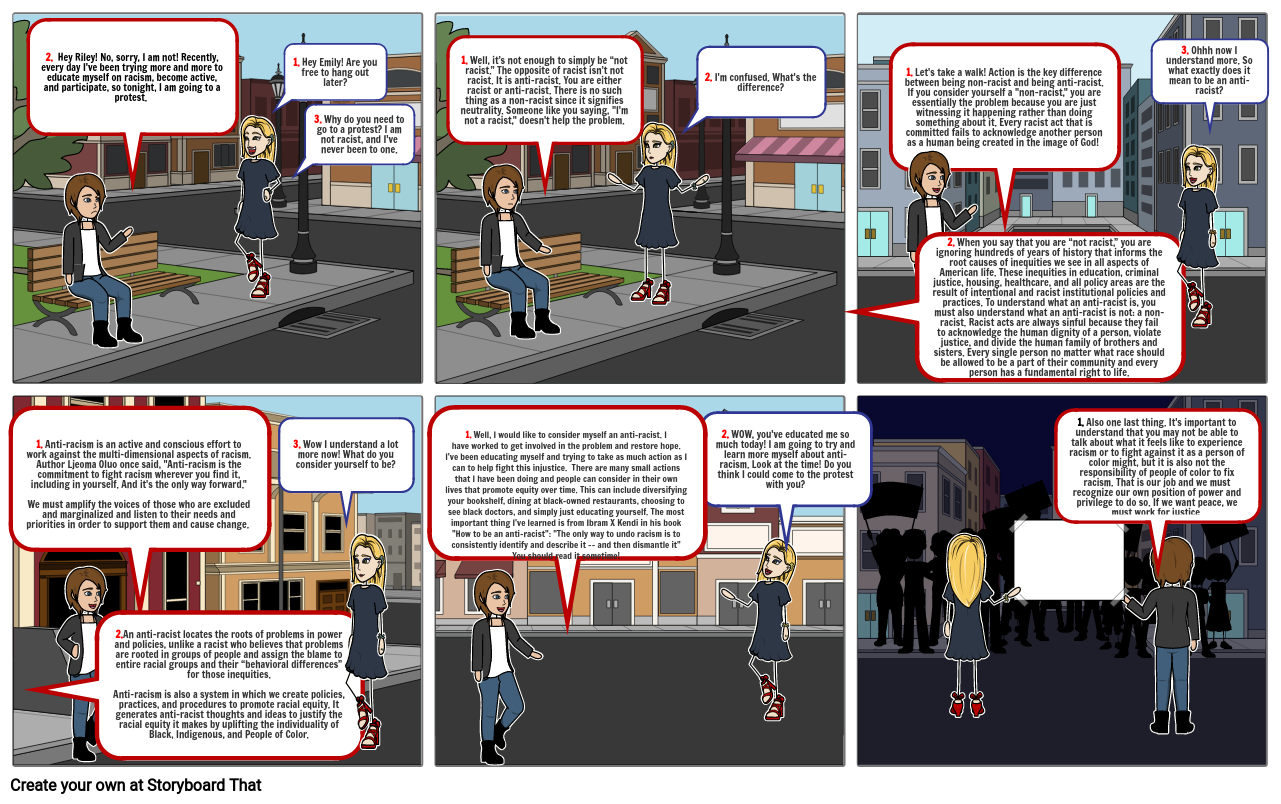anti racist

Montāžas Teksta
- 2. Hey Riley! No, sorry, I am not! Recently, every day I've been trying more and more to educate myself on racism, become active, and participate, so tonight, I am going to a protest.
- 1. Hey Emily! Are you free to hang out later?
- 3. Why do you need to go to a protest? I am not racist, and I've never been to one.
- 1. Well, it’s not enough to simply be “not racist.” The opposite of racist isn’t not racist. It is anti-racist. You are either racist or anti-racist. There is no such thing as a non-racist since it signifies neutrality. Someone like you saying, "I'm not a racist," doesn't help the problem.
- 2. I'm confused. What's the difference?
- 2. When you say that you are “not racist,” you are ignoring hundreds of years of history that informs the root causes of inequities we see in all aspects of American life. These inequities in education, criminal justice, housing, healthcare, and all policy areas are the result of intentional and racist institutional policies and practices. To understand what an anti-racist is, you must also understand what an anti-racist is not: a non-racist. Racist acts are always sinful because they fail to acknowledge the human dignity of a person, violate justice, and divide the human family of brothers and sisters. Every single person no matter what race should be allowed to be a part of their community and every person has a fundamental right to life.
- 1. Let's take a walk! Action is the key difference between being non-racist and being anti-racist.If you consider yourself a "non-racist," you are essentially the problem because you are just witnessing it happening rather than doing something about it. Every racist act that is committed fails to acknowledge another person as a human being created in the image of God!
- 3. Ohhh now I understand more. So what exactly does it mean to be an anti-racist?
- 1. Anti-racism is an active and conscious effort to work against the multi-dimensional aspects of racism.Author Ljeoma Oluo once said, "Anti-racism is the commitment to fight racism wherever you find it, including in yourself. And it's the only way forward."We must amplify the voices of those who are excluded and marginalized and listen to their needs and priorities in order to support them and cause change.
- 2.An anti-racist locates the roots of problems in power and policies, unlike a racist who believes that problems are rooted in groups of people and assign the blame to entire racial groups and their “behavioral differences” for those inequities.Anti-racism is also a system in which we create policies, practices, and procedures to promote racial equity. It generates anti-racist thoughts and ideas to justify the racial equity it makes by uplifting the individuality of Black, Indigenous, and People of Color.
- 3. Wow I understand a lot more now! What do you consider yourself to be?
- 1. Well, I would like to consider myself an anti-racist. I have worked to get involved in the problem and restore hope. I've been educating myself and trying to take as much action as I can to help fight this injustice. There are many small actions that I have been doing and people can consider in their own lives that promote equity over time. This can include diversifying your bookshelf, dining at black-owned restaurants, choosing to see black doctors, and simply just educating yourself. The most important thing I've learned is from Ibram X Kendi in his book "How to be an anti-racist": "The only way to undo racism is to consistently identify and describe it -- and then dismantle it" You should read it sometime!
- 2. WOW, you've educated me so much today! I am going to try and learn more myself about anti-racism. Look at the time! Do you think I could come to the protest with you?
-
- 1. Also one last thing. It's important to understand that you may not be able to talk about what it feels like to experience racism or to fight against it as a person of color might, but it is also not the responsibility of people of color to fix racism. That is our job and we must recognize our own position of power and privilege to do so. If we want peace, we must work for justice.
Izveidoti vairāk nekā 30 miljoni stāstu shēmu

